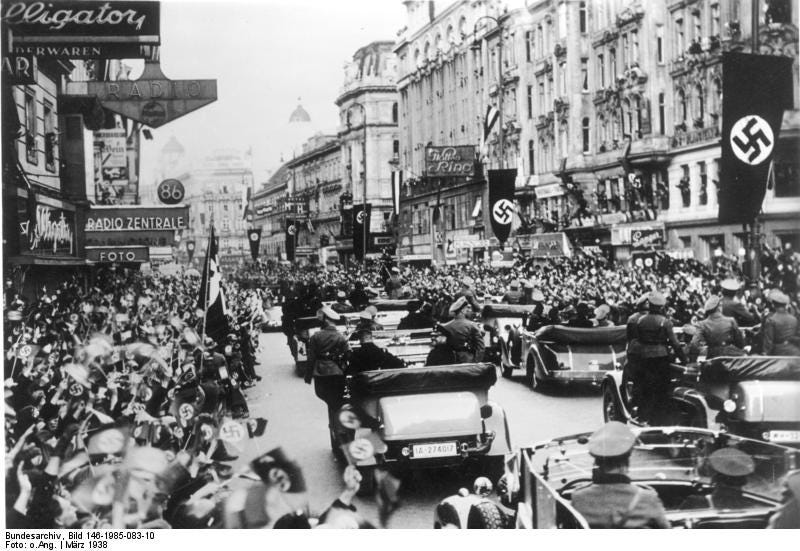Adorable Story #18: Felix Rohatyn, The Financier Extraordinaire
This week we go back in time to Vienna in the 30s to learn about the adventurous life of Felix Rohatyn

As a courtesy to our free subscribers, once a month we unlock one full Adorable Story from our archives.
If you aren’t subscribed yet, hit the subscribe button below to receive the Adorable Stories every weekend, directly in your inbox:
This week Adorable Story will take us to the tumultuous times of Vienna in the 30s, and then, through a perilous journey, to Paris, Casablanca, Lisbon, Rio de Janeiro and finally New York City where a young boy became a financier extraordinaire.
Rohatyn Family
Felix George Rohatyn was born in Vienna on May 29, 1928, the only son of Alexander Rohatyn, a Polish Jew of Ukrainian descends, and Edith (Knoll) Rohatyn, a native of Austria.
The Rohatyn family was quite well-to-do: his great-grandfather, Feivel Rohatyn, was Chief Rabbi of Zlotshov, 50 km from the Ukrainian town of Rohatyn, which in Ukrainian means “Horn Stacket”.
From Vienna, his father managed breweries controlled by the family in Austria, Romania, and Yugoslavia.
Escape from the Nazi
After Hitler rose to power in 1933, the desire for a political annexation of Austria (Anschluss) into the “Greater Germany” started gaining traction among the German political elite.
During an attempted coup in 1934, Austrian chancellor Engelbert Dollfuss was assassinated by Austrian Nazis.
At the same time, Jewish communities in Austria felt increasingly unsafe because of a prospect of ethnic cleansing occuring in Austria in case of a forced unification with Nazi Germany.
Quite presciently given the circumstances, the Rohatyn family — notwithstanding their business ties with Central Europe — decided to leave Austria for Paris, France in 1935 (the Anschluss would have occurred in 1938, with persecution of the Jews in Austria starting, indeed, immediately thereafter).
At the time, things started being increasingly dangerous for the Jews also in France and, as a precaution, Felix was sent to boarding school in Switzerland (“which I didn’t like”, Felix would recollect many years later).
After the German invasion of France in 1940 and the sudden collapse of the French army, the Rohatyn family — without any papers or visas — decided to abruptly leave Paris, took their car, two mattresses and their gasoline coupons (bought at the black market) and directed straight south to the Pyrenees in the attempt to reach neutral Spain.
Unfortunately, not only the roads to Spain were jammed by the mass exodus of people attempting to flee France (it took them more than two weeks to reach the Pyrenees), but the actual border between France and Spain was already closed by the Vichy puppet-government and the only way to escape would have been to cross the Pyrenees (illegally) on foot at night-time.
Since Felix’ grandmother was 80 years old at the time, the family decided to give up the idea of crossing the mountains on foot and opted to reach Cannes instead.
After a long wait there, the family was somehow able to obtain diplomatic visas to Brasil.
Luis Martins de Souza Dantas, the Brazilian ambassador to France (Brazil’s “Oscar Schindler”), illegally granted Brazilian diplomatic visas to hundreds of Jews in France during the Holocaust, saving them from certain death: one of these visas allowed the Rohatyns to escape the Gestapo and finally flee to Morocco.
In fact, in an escape that lasted well over 2 years, they fled first to Casablanca, then to Lisbon and, after another excruciating wait there, in 1941 they secured a seat on a transatlantic boat to Rio de Janeiro.
Felix went to school in Rio de Janeiro for almost two years before the Rohatyns managed to enter the United States in 1943-44 under the “Polish Quota”.
A wonderful interview of Felix was recorded in 2009 in the video below, kindly provided by The International Raoul Wallenberg Foundation.
Career at Lazard Frères
"Investment banking is like a high-class form of prostitution. You have to do whatever the client wants."
— Felix Rohatyn, in an interview for the The New York Times, November 9, 1975.
After studying at McBurney School and Middlebury College, in 1948 Felix joined the New York office of the investment bank Lazard Frères as an entry-level clerk, under André Meyer’s helm.
André Meyer was a legendary French-American investment banker who at the time was a senior partner at Lazard Frères: he would be later called “the Picasso of Bankers”.
Coincidentally, André Meyer also escaped France in the 40s in order to avoid the jewish prosecution there: differently from Felix, and crucially, André and his family were somehow able to secure almost instantaneously the visas to Spain (notwithstanding the closed border) and a much coveted seat on the PAN-AM Clipper seaplane (notwithstanding a multi-year waiting list), on the direct route from Lisbon to New York1 .
In New York, André became the mentor of Felix, who was made partner in the firm in 1961 and later became its managing director.
While at Lazard, Felix brokered numerous, major mergers and acquisitions, notably on behalf of International Telephone and Telegraph (ITT), where he became a director in 1966.
Some of the notable deals he played a key role in include:
ITT and Hartford Fire Insurance (1960s): Felix was instrumental in the merger of International Telephone and Telegraph (ITT) with Hartford Fire Insurance. This deal was one of the largest at the time and significantly expanded ITT's business portfolio.
ITT and Avis Rent A Car (1970s): Felix also advised ITT on its acquisition of Avis Rent A Car, further expanding its business operations into the car rental industry.
Bendix Corporation and Martin Marietta (1982): Felix advised Bendix Corporation in its attempted takeover of defense contractor Martin Marietta. The deal ultimately turned into a contentious and complex takeover battle, in which Martin Marietta successfully fended off the acquisition by employing what later became known as a "Pac-Man" defense, where the target company turns around and tries to acquire the company attempting the hostile takeover.
Time Inc. and Warner Communications (1989): Felix played a crucial role in advising Time Inc. on its merger with Warner Communications, which resulted in the creation of Time Warner, one of the largest media and entertainment conglomerates in the world at the time.
Macy's and Federated Department Stores (1994): As Macy's financial advisor, Felix helped the company negotiate its merger with Federated Department Stores (now Macy's, Inc.), creating one of the largest retail groups in the United States.
Felix “the Fixer”
In 1975, New York City was on the brink of bankruptcy with a USD 3.3 billion budget deficit.
Governor Hugh L. Carey appointed Felix Rohatyn as chairman of the Municipal Assistance Corporation (MAC) to restructure the city's debt. For his service, he was called “Felix the Fixer.”
After difficult negotiations, MAC refinanced the city's short-term debt, reduced spending, and restored investor confidence. The plan worked, saving New York City from bankruptcy.
As the chairman of MAC, Rohatyn played a critical role in helping the city recover from the brink of bankruptcy. His efforts had several key effects:
Debt Restructuring and Financial Reforms: Rohatyn helped devise a plan to restructure New York City's debt, which included the issuance of long-term bonds by the MAC, providing the city with much-needed cash. He also played a central role in negotiating with banks, labor unions, and other stakeholders to implement financial reforms, including spending cuts, increased taxes, and more stringent financial controls.
Restoring Confidence: Rohatyn’s leadership and financial expertise were crucial in restoring confidence in New YorkCity's ability to manage its finances. By working with various stakeholders to develop and implement a recovery plan, he helped to reassure investors, creditors, and residents that the city could overcome its financial challenges.
Influence on Public Finance: Rohatyn’s work on the New York City financial crisis brought attention to the importance of sound financial management in public institutions. The crisis and its resolution demonstrated the need for greater oversight, transparency, and cooperation among different levels of government, as well as the private sector.
Cementing Rohatyn’s Reputation: Rohatyn’s successful efforts in resolving New York City's financial crisis further solidified his reputation as a skilled financier and problem solver.
Legacy of Fiscal Responsibility: The financial reforms and measures implemented during the crisis, in part due to Rohatyn’s guidance, contributed to a lasting legacy of fiscal responsibility and financial discipline in New York City. The city's experience during this period served as a cautionary tale and a lesson in the importance of prudent fiscal management for other cities and municipalities.
Felix the Diplomat: Ambassador to France
Felix aspired to become Treasury Secretary when Bill Clinton won the presidency in 1992, but his failure to support Clinton early in the campaign probably cost him that job (at the time, Felix had favoured Mario Cuomo, before supporting the independent candidacy of Ross Perot).
In 1997, President Bill Clinton appointed Felix Rohatyn as the United States Ambassador to France, a position he held until 2000.

During his tenure, Rohatyn navigated delicate diplomatic waters and strengthened the ties between the two nations. He was also instrumental in securing French support for NATO's intervention in Kosovo in 1999.
During his ambassadorship in France, Felix met some relatives of André Meyer 50 years after he had escaped to the United States, and he recollected the encounter as follows:
“There are people today, whom I met in Paris, who were related to André and who will never forgive him for leaving and leaving them behind, because they went through Spain, which others were not able to do.”
After completing his ambassadorship in France and returning to the United States, Felix served as advisor at various financial institutions, including Lehman Brothers and Rothschild.
Felix died in New York on December 14, 2019 at 91 years old.
At his funeral, President Bill Clinton gave the following remark:
“The great thing about Felix Rohatyn was that he had three gifts that were essential to holding a society together and building a better future. He had a healthy respect for the past and the need to learn its lessons; he had an uncommon ability to analyze a conflict situation and explain it to people; but more important he had the ability to envision a better future and put together a plan to achieve it — and a dogged determination to stay with it even if it took 20 years.”
— Alberto @
The flight included a refuelling stop in the Azores.









